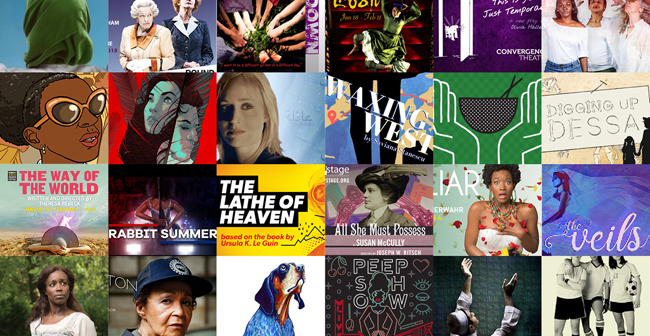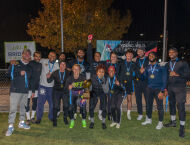Culture

Women’s Voices Theater Festival Challenges Status Quo
January 27, 2018 @ 12:00am
A PTSD-ridden marine plans her wedding. A man is held without charge in Guantanamo for 12 years. A reimagined Shakespeare play gives minorities the chance to be heard. A series of one-act plays follow the hard-luck stories of everyday people struggling to find their place in the world.
Though the plots and themes of these plays are unique, each shed light on critical issues and give a voice to those that need it most. The female playwrights behind these original works are creating a safe space for audiences to explore these ideas, and perhaps spark their own dialogue after leaving the theater. And their plays, along with 20 others, are the featured productions in the 2018 Women’s Voices Theater Festival, in the nation’s capital through March 14.
The buzz around this homegrown festival, back for the second time after its debut in 2015, has been overwhelming. Not only is actress Allison Janney on board this year as honorary chair, but the sheer volume of local talent and prestigious theaters involved is truly remarkable. It speaks volumes that our community views this celebration of new plays written by women and produced by local companies as an exciting opportunity, one worth embracing and promoting throughout the city.
And while this local support is encouraging, the statistics are quite the opposite. A 2015 Lilly Awards/Dramatists Guild study found that 22 percent of all productions in U.S. theaters were written by women, a percentage that sadly has hardly changed in the past three years.
Annalisa Dias, whose play 4,380 Nights is running at Signature Theatre in Shirlington through February 18, says the statistics speak for themselves as to why the festival is needed.
“I think the spotlight that’s getting shined on female playwrights right now in this city is pretty outstanding, and we’re the only city doing it,” she says. “It’s an exciting time to be a playwright living in DC.”
Dias wrote 4,380 Nights after reading a three-sentence blurb in The Washington Post about two Algerian detainees who had been released from Guantanamo Bay the day before. She was taken aback by how little space the news received and had the realization that a lot of us had forgotten that the center was very much still in operation – or worse, we were turning a blind eye to it.
To her, presenting her work at Signature is an opportunity to engage audiences and ask questions like, “How can we look at each other as citizens of this country knowing that Guantanamo exists and that our government allows it to exist?” and, “How can we imagine a future together where a place like Guantanamo couldn’t exist?”
“I’m interested in sitting with people and thinking about big questions about how our system works,” she says. “I don’t have answers. I just have a lot of questions.”
Hope Villanueva also has questions.
In her Nu Sass-produced play The Veils, at Anacostia Arts Center from February 15 through March 4, she breaks an incredibly common stereotype. When you think of someone in the military with PTSD, who pops into your head first: a man or a woman?
The playwright doesn’t hold that against anyone; in fact, she was in a serious relationship with a marine who had a terrible time transitioning back into civilian life and actually partially inspired The Veils. And she says it makes sense, after years of the arts – whether it be film and TV or theatre – portraying women as one-dimensional: the girlfriend, the wife, the mother, the hot/slutty chick.
So Villaneuva’s heroine is a marine with PTSD, and she’s also about to get married.
“Why can’t she be competent with a rifle in her hand and be able to handle that and war, and still want to feel feminine on her wedding day?” she asks. “Why can’t it be both?”
It can be, and in some ways her play taps directly into the festival initiative. She read about and met female marines whose stories have mirrored the one she wrote for the stage, and it was empowering to know that she had created something powerful enough to speak to their experiences.
When it comes to giving women more opportunities to create and lead in theatre, Villaneuva says there has to be someone or something – maybe even this festival – that kicks open the door first and says, “Look, we’re missing this whole swarth of people and opportunities,” so that we can get to the place where talent really is all that matters.
“I don’t think we’re on the other side of that door yet, but that’s the dream.”
This sentiment seems to be shared by the four playwrights I spoke with, but some challenge what makes the festival successful more than others. Charlie Marie McGrath says she has mixed emotions about the concept.
She raises the point that if a participating theater chose to be in the festival, they may feel they have met their quota for the season by having one female director or playwright.
“We need to take the spirit of the Women’s Voices Theater Festival and make that the norm.”
McGrath’s original adaptation of Shakespeare’s Cymbeline incorporates shadow puppetry and other stylized elements, re-contextualizing the Bard’s characters for modern day audiences. Imogen is produced by Pointless Theatre and housed by DanceLoft on 14th through February 11 – marking one of the space’s first forays into the world of theatre – and as each scene unfolds, the actors drop more and more of their Renaissance garb and begin to resemble 21st-century versions of their characters. She says everybody living outside of the court – outside of the mainstream, basically – turn out to be the nicest guys in the play.
“I think it [gives] a little social context. It’s about young black men who think that the law won’t protect them. It’s about women who think they’ll never be in power. It’s about people who think they have no options in life, and I think that that feels like the situation of a lot of young people today.”
Another common thread among the playwrights is the idea of relatability, that what one of their characters is going through can tangibly mirror what is happening in an audience member’s life. Yes, theatre has come a long way from the very misconceived notions of being designed for a silver-haired, affluent crowd decked out in their evening best; but even still, having in-depth conversations with four women who are creating art meant to reach those of us in our 20s or 30s or 40s who are still trying to figure it out is pretty amazing.
The format of Audrey Cefaly’s Love Is A Blue Tick Hound – four one-act plays at 20 minutes each – may diverge from the others, but the human element remains intact. She says her work, coming to the Logan Fringe Arts Space from February 9-17 via Rapid Lemon Productions, is a collection of stories that are universal to all ages, shapes, sizes, colors and languages.
“You have everything from scrappy, young, female mill workers to an immigrant dishwasher who has a crush on a waitress,” she says. “It’s not one of these plays that you have to have any kind of education to understand and to feel its heartbeat. It’s really just a collection of love stories that are told simply with characters that are just like all of us.”
The playwright invites audiences to hear her stories and maybe contribute their own voices to the narrative.
“There’s plenty of silence and subtext, so that an audience hopefully can relax into the stories and maybe see themselves. Because ultimately, I think we’re in a lot of pain in this world and we all need these stories of light and healing, so we don’t feel so alone.”
Cefaly’s earnestness extends to the festival as a whole, and she credits projects like this one with raising awareness about the creative teams in theatre – not just the playwrights, she adds – who are chalk full of incredible female talent.
“I think we’ve always had incredibly gorgeous, vibrant, female voices in our midst. [But] they don’t always get a place at the table.”
And while she says she wants to see good theatre, whether it’s written by a male or female playwright, she won’t have access to the latter unless women get the same opportunities as their male colleagues.
What admittedly started in my mind as a piece featuring vignettes of each playwright’s upcoming production instead has taken shape as my own “light bulb” moment that I hope resonates with our readers. How do we take the mission of the Women’s Voices Theater Festival and give it actionable meaning year-round, and how do we make sure that women in theatre are given a seat at the table? After speaking with these playwrights, I’m pretty sure they deserve to be at its head.
Learn more about all participating productions and theaters, including dates, locations and ticket prices, at www.womensvoicestheaterfestival.org.







